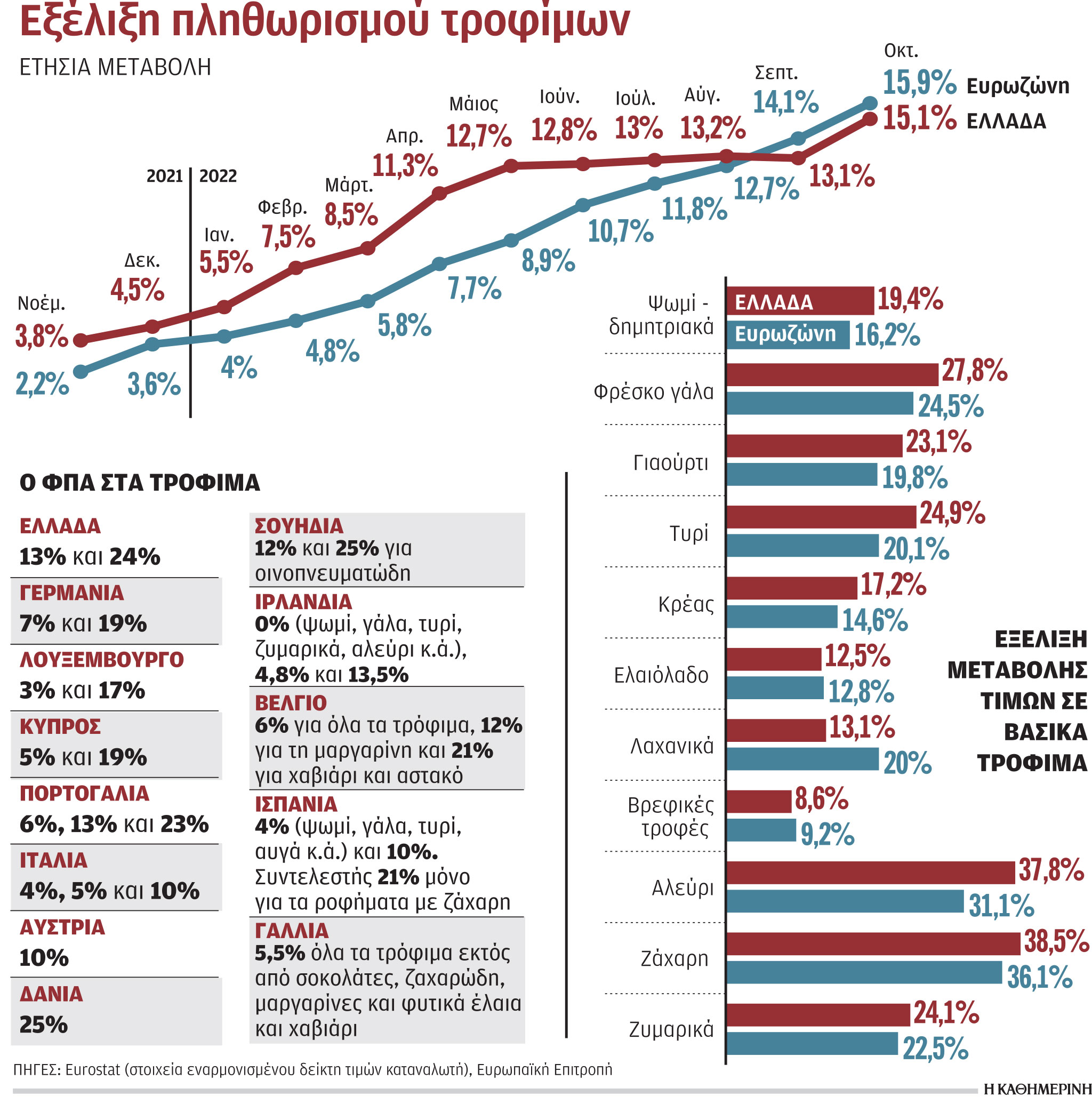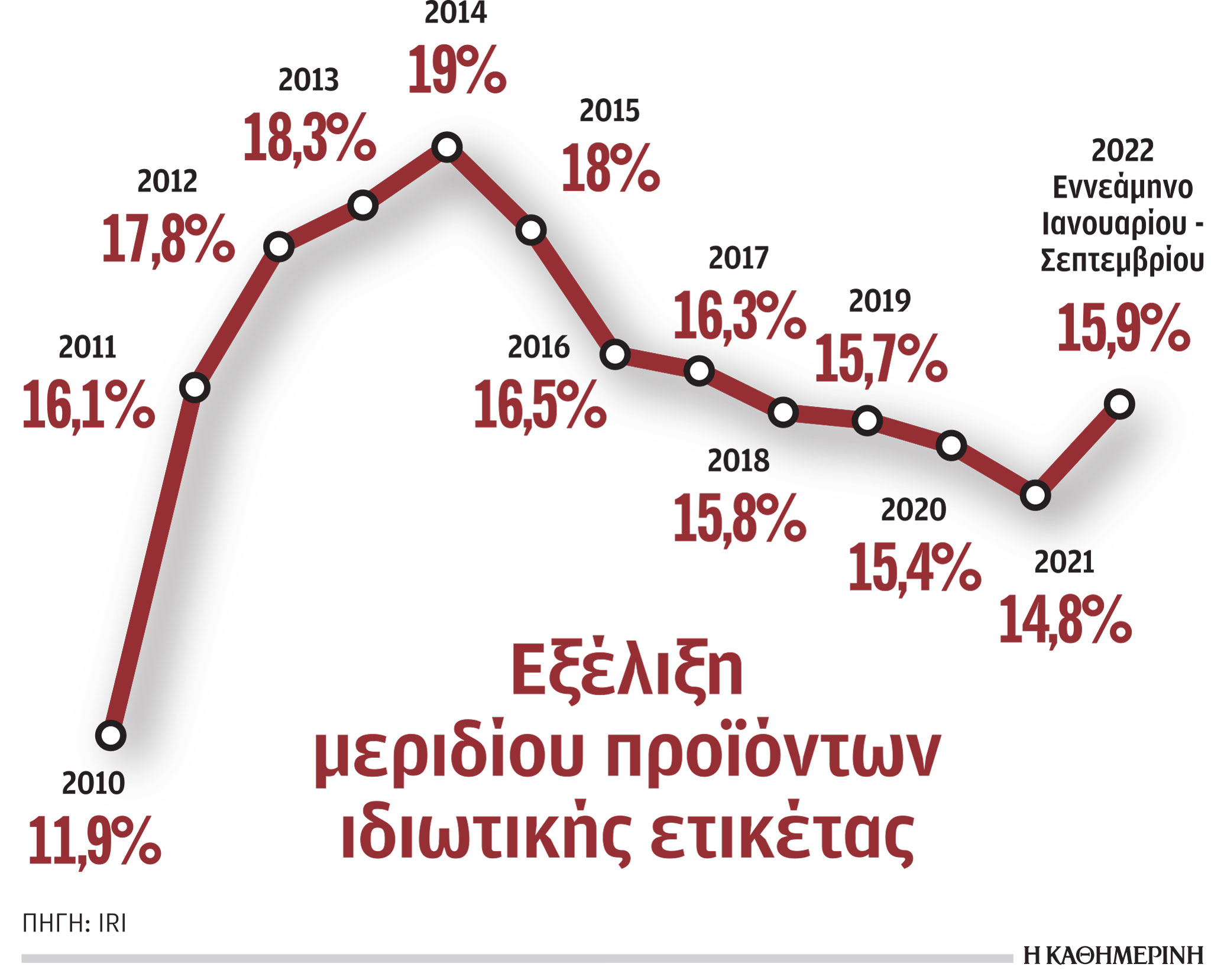
It is possible that the inflationary crisis that we have been experiencing for almost a year has intensified since February due to fluctuations in energy prices, as well as for a number of basic products, such as grain, caused by Russia’s invasion of Ukraine. but in Greece, here and for many decades, the prices of food and other household items have never been commensurate with the purchasing power of the inhabitants of the country. This discrepancy persisted even during the decade-long economic crisis, despite the recession-induced reduction in consumption, with the so-called internal devaluation affecting only wages, pensions and incomes in general, not prices. In 2021, Greece’s GDP per capita in terms of purchasing power was 65% of the European Union average, penultimate with Bulgaria in last place. However, food prices in the same year were 4.8% higher than the European average.

Great dependence of Greece on imports of primary and secondary materials (positive balance in finished food products), small market size, not subject to price competition mainly from suppliers, Greek and mainly foreign, rather suppliers that still exist, despite occasional singling out by the Competition Commission and the government’s pronouncements of “clean” price laws, are the main inherent causes of the age-old phenomenon of “spot fixing” in our country. absolute prices of similar goods in Greece and other European countries, with Greece appearing to be more expensive compared to countries with higher purchasing power (e.g. Germany and France), during this last crisis food inflation in Greece was consistently higher than in the Eurozone with November to August, while “ra explosion” even increased by 3.8 percentage points. Added to the above factors is the high VAT on food in Greece, with rates of 13% and 24%, comparable only to the levels of Sweden and Denmark. In Ireland, zero VAT on basic foodstuffs, in Spain and Italy 4%, in France 5.5%, excluding only confectionery, chocolate, margarine and … caviar, in Germany 7%.
As for the subject of dependence on the main raw material, the example of bread and a number of products in which flour is the main raw material is typical. Bread is made from flour that mainly comes from soft wheat, a product that is grown in very small quantities in Greece, unlike durum wheat, which is mainly used to make pasta. Greece covers only 10% of its soft wheat needs through domestic production and imports the rest. Before the start of the war in Ukraine, in fact, 30% of its needs were covered by imports from Russia and Ukraine. It is worth noting that until 1984 there was a surplus of soft wheat in Greece, but the high subsidies on hard wheat that Italy promoted for its own reasons caused many Greek farmers to switch to soft wheat. In October, bread prices rose 19.4% year-on-year in Greece, compared to 16.2% growth in the Eurozone, according to the latest data from Eurostat. It is worth noting here that this year, according to nine months of data, there is a deficit of 547.07 million euros in the balance of agricultural products, compared with a surplus of 295.74 million euros in the corresponding period of 2021.
The fact that, firstly, they are not produced in Greece and, secondly, the small size of the domestic market, is largely due to the fact that many products of transnational groups have a higher price here compared to other European countries. In order for the companies to be profitable enough in the small Greek market, where, due to the geographical location, the delivery of products is more expensive compared to the countries of Central Europe, the products are sold with a higher profitability. The absence of additional domestic competitors in some product categories effectively creates an informal oligopoly. Thus, a branded shower gel of a large multinational (package of 750 ml) in Greece is sold at a price of 6.10 euros, in Spain 4.60 euros, in France 5.75 euros. The well-known liquid dishwashing detergent is sold for 5.95 euros/litre in Greece, 3.53 euros/litre in Germany, and 4.60 euros/litre in Spain. For a pack of #2 diapers from a very popular brand, consumers in Greece pay €19.45 (a pack of 46) or €0.42 each, compared to €10.58 in Germany, €17.48 in France and €18 in Spain. .40 euros. .
Even during the 10-year debt crisis, when internal devaluations affected wages rather than prices, food prices were high, based on the purchasing power of Greeks.
At the same time, although the supermarket sector in Greece is still not highly concentrated – the largest of the market participants, Sklavenitis, has a market share of 31.7% – patterns of behavior can be identified in relations between suppliers and suppliers. retailers that distort competition.
Barriers to retail entry exist, such as the high cost of so-called shelf entry fees, while there are no shortages, according to a major industry investigation by the Competition Commission and released last year. cases where discounts are requested from suppliers in order for the chain to provide them with good shelf space.
With regard to cost pass-through, EA’s study, however, conducted in the absence of inflationary pressures, showed that for every 1% increase in the cost of purchasing a chain from a supplier, the chain increases the price by up to 0.5% (depending on the product) , i.e. absorbs half of the increase.
But what happens in the opposite case, i.e. if the purchase prices fall? Rather, the well-known “what goes up, it doesn’t go down” seems to apply here as well. “Discounts/rebates are generally ad hoc and one-off (i.e. not related to the pricing time of the products they apply to) and are not directly included in the purchase price at the time the products are delivered by supermarkets. This raises the question of whether these benefits are passed on to consumers in the form of lower retail prices,” the Competition Commission notes.

Precision and private label change the game in supermarkets
After two years when, due to the pandemic and many months of quarantines, households spent a very large part of their income on shopping in supermarkets, especially branded and premium ones, as they considered them safer and healthier, this year, organized food retail chains are faced with a completely different situation. , which puts pressure on two levels: rising energy prices strongly affect their own operating costs, reducing profit margins, and skyrocketing prices lead to lower consumption.
Any increase in turnover since the beginning of the year is inflationary, as sales have fallen significantly. According to NielsenIQ, for the period January-September 2022, supermarket chain sales (excluding islands and Lidl) were €7.278 billion compared to €6.958 billion in the corresponding period of 2021, up 4.6%. At the same time, the decrease in units is calculated by NielsenIQ at the level of 1.8%. In other words, the €320 million we paid more is due to higher prices, not higher consumption.
The new market conditions are forcing supermarket chains to change strategies to maintain or even increase their market share, which is difficult in an environment where the pie is shrinking, and at the same time continue to grow organically through network expansion, but also through acquisitions. As for the second, rising operating costs and lower consumption are estimated to hit mainly small and medium-sized chains, several of which received “life extensions” due to COVID-19.
The change in strategy brought about by the new crisis, the inflationary crisis, is evidenced by the fact that AB Vassilopoulos has focused on private label products. In addition to the “home shopping cart”, in which about 50 of the 74 products are trademarks, the network is “launching” an offer program with the characteristic name “daily low price”, which currently participates in 850 codes with a goal of up to 1200. Most of these are private label products, with Nikos Lavydas, CEO of AB since August last year, characteristically pointing out a few days ago: “Our big disadvantage is that people find us expensive. We need to change this perception. With these private label products, we will be able to see the competition.” AB Vassilopoulos’ investment in private label products is not new, as it actually started in 2009 when the financial crisis hit. However, the promotion of private label products at this stage is due to the shift that consumers have already made. The share of private label products in the nine months was 15.9% after a six-year downward trend, and their sales increased by 12.8% compared to last year.
Sclavenitis has also invested heavily in private label products of 24 different brands depending on the category (e.g. Marata, Bonora, Buenas, Arion for food, Drolio for detergents), while sales of these products are approximately 20 %. from its total turnover.
After all, the fact that Lidl Hellas is likely to take second place in terms of market share, having at this stage a competitive advantage as the only “hard discounter” in the Greek market, motivates other chains to adjust their policies. respectively .
However, it is worth noting that the strengthening of private label products is changing the balance in the relationship between retailers and suppliers, with the former in a stronger position. “Entering the market of goods under their own trademarks allows retailers to act as both competitors and key customers of various manufacturers. Retailers may de facto know certain commercially sensitive information about the promotional strategy pursued by brand name manufacturers. This privileged position increases the pressure that retailers can exert on them,” notes E.A.
The widely discussed “basket for households” was added to the factors shaping the new strategy, not in the sense of changing advertising programs between suppliers and retailers, as was agreed upon long ago, but because the action is accompanied by a lot of publicity, mainly from the Ministry of Development. affecting some consumers to some extent.
It is no coincidence that, in addition to 11 chains that were required to participate in the “basket” due to their turnover, 5 more voluntarily joined the action. According to a survey conducted by the Research Institute for Consumer Goods Retail, four out of 10 -for the “basket” visited a different supermarket than before.
Lori Barajas is an accomplished journalist, known for her insightful and thought-provoking writing on economy. She currently works as a writer at 247 news reel. With a passion for understanding the economy, Lori’s writing delves deep into the financial issues that matter most, providing readers with a unique perspective on current events.